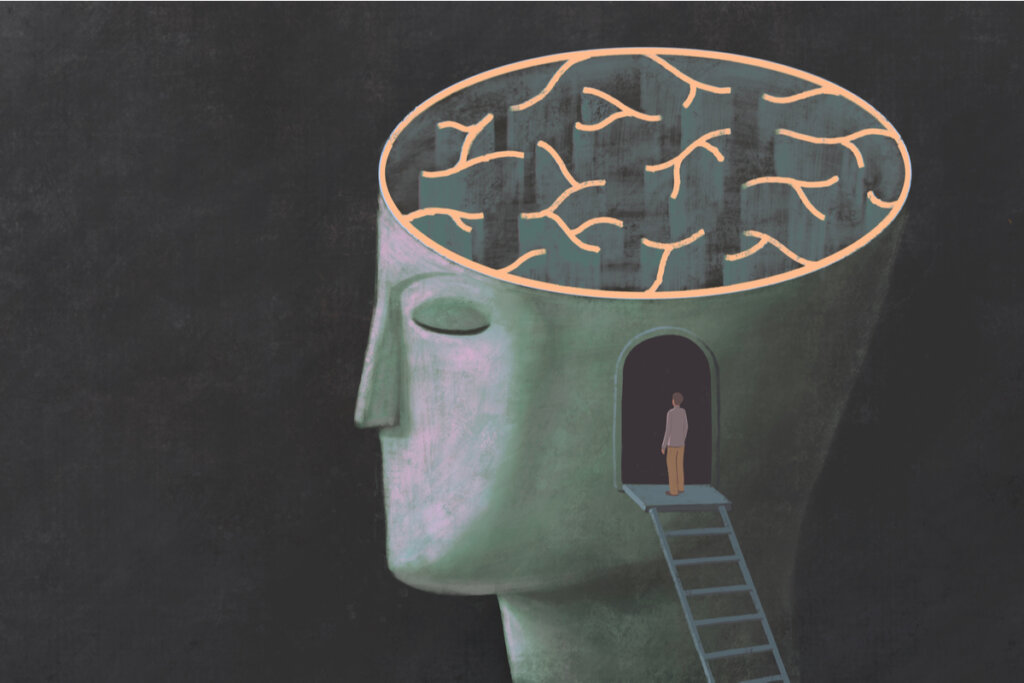The Voice in Your Head: Is it You?


Written and verified by the psychologist Valeria Sabater
At times, it’s kind and wise. At others, it’s your worst enemy and criticizes you in everything you do. But, what exactly is the voice in your head? Is it the product of an auditory hallucination? Is it part of your consciousness? And, does everyone hear these voices?
Scientists started to study the psychological phenomenon of the internal voice at the end of the 90s. To date, they’ve found some interesting data. They claim that this mental process favors psychological objectives, such as planning, problem-solving, reflection, and self-knowledge. However, at times, other less healthy phenomena can also be experienced.
An inner voice is something we all possess and experiencing auditory hallucinations is common.

The voice in your head
For a long time, it was the field of philosophy that tried to understand and define the inner voice. In fact, it wasn’t until 1993 that the subject was addressed from a psychological perspective, thanks to a study conducted by Hubert Hermans and Harry Kempen, from the Radboud University of Nijmegen, in the Netherlands. They defined this brain phenomenon as an internal discourse that shapes the human being.
This psychological reality is known by different names. For example, internal dialogue, inner voice, covert speech, auditory imprints, etc. The psychologist, Lev Vygotsky suggested that this ability begins around the age of three. At this age, the development of speech is maturing and the child begins to separate their language from their thoughts.
What produces the voice in your head?
Your inner voice is a mechanism that your brain produces when you talk to yourself in your head. It might come up with a single word or vocalize a forceful phrase like “Don’t forget to take your keys with you”. It’s a kind of intrapersonal communication that usually manifests itself in three different ways.
The University of Grenoble( France) conducted a study that analyzed these typologies. They’re as follows:
- Dialogue. It allows you to talk to yourself.
- Condensation. The voice in your head can come in the form of an image, single words, or long sentences.
- Intentionality. The voice might appear for a specific purpose. For example, to help you solve a problem. Alternatively, it can occur randomly and not make much sense.
The purpose of your inner voice
The voice in your head promotes thinking with greater clarity. In fact, its first objective is to serve as a mental instrument for you to reason and reflect on your surrounding reality. Furthermore, it contributes positively to your social relationships. In fact, there’s a direct link between internal dialogue and empathy.
Your inner dialogue is a form of introspection that helps you understand and connect with your surroundings. Indeed, if your inner voice talks positively to you, your self-awareness improves and provides you with certain psychological health benefits.
Inner speech is linked to the development of language skills and more complex mental processes such as planning or solving problems.
People who don’t chat to themselves
We all have inner voices but some of us don’t talk to ourselves. This condition in which an individual doesn’t make use of intrapersonal conversation is called aphantasia or mind-eye blindness.
It consists of the impossibility of imagining, carrying out visualizations, interacting with ourselves, mentally drawing plans, and dreaming. As such, a lack of internal speech makes it difficult to carry out complex reasoning and planning.
Auditory hallucinations
What would happen if the voice in your head was really disruptive and said negative or threatening things to you? Moreover, if, instead of one, there were more? The experience of hearing voices can sometimes be related to auditory hallucinations. They’re frequent phenomena. In fact, between five and 15 percent of the population will suffer from them at some point.
Although these experiences are often linked to schizophrenia, they can be due to many more factors. Not all of them are within the clinical field. Here are the kinds of situations that tend to trigger this less common yet disturbing process.
- Hearing problems.
- Consumption of alcohol or drugs.
- Loneliness or isolation.
- Suffering psychological trauma.
- When falling asleep, the individual hears voices speaking words that seem really vivid. They’re types of hallucinations typical of certain phases of sleep.
Having good internal dialogues with ourselves that are compassionate and reflective makes it easier for us to better manage our emotions and needs.

Will the voice in your head always be there?
Your inner voice is an inherent part of you. Therefore, your mission should be to take care of it. In fact, you must bear this in mind so that what it tells you is always beneficial for your well-being. However, this internal presence can sometimes act on automatic pilot. Consequently, it suddenly becomes critical and is dominated by a really negative and exhausting approach.
Moreover, it may sometimes disappear. For instance, when you go through times of stress, you allow your mind to wander and disengage from your inner voice. This means that the voice in your head is suddenly silent because you’re focusing more on what’s happening outside than inside.
This can be negative because it means you stop reflecting and attending to your emotions and needs. In addition, your thoughts become rigid and negative. You no longer reason, you only react. But, it’s imperative that you continue listening to your internal voice and take care of it. Indeed, it’s the best companion you can have on the journey of life. It allows you to be more aware of your surroundings as well as your feelings.
All cited sources were thoroughly reviewed by our team to ensure their quality, reliability, currency, and validity. The bibliography of this article was considered reliable and of academic or scientific accuracy.
- Alderson-Day, B., & Fernyhough, C. (2015). Inner Speech: Development, Cognitive Functions, Phenomenology, and Neurobiology. Psychological bulletin, 141(5), 931–965. https://doi.org/10.1037/bul0000021
- Grandchamp, R., Rapin, L., Perrone-Bertolotti, M., Pichat, C., Haldin, C., Cousin, E., Lachaux, J. P., Dohen, M., Perrier, P., Garnier, M., Baciu, M., & Lœvenbruck, H. (2019). The ConDialInt Model: Condensation, Dialogality, and Intentionality Dimensions of Inner Speech Within a Hierarchical Predictive Control Framework. Frontiers in psychology, 10, 2019. https://doi.org/10.3389/fpsyg.2019.02019
- Hermans, H. J. M., & Kempen, H. J. G. (1993). The dialogical self: Meaning as movement. Academic Press. https://psycnet.apa.org/record/1993-98537-000
- Schweingruber, D., Wahl, D. W., Beeman, S., Burns, D., Weston, G., & Haroldson, R. (2022). Voices in and Uses of Internal Conversations. Social Currents, 0(0). https://doi.org/10.1177/23294965221139847
This text is provided for informational purposes only and does not replace consultation with a professional. If in doubt, consult your specialist.








